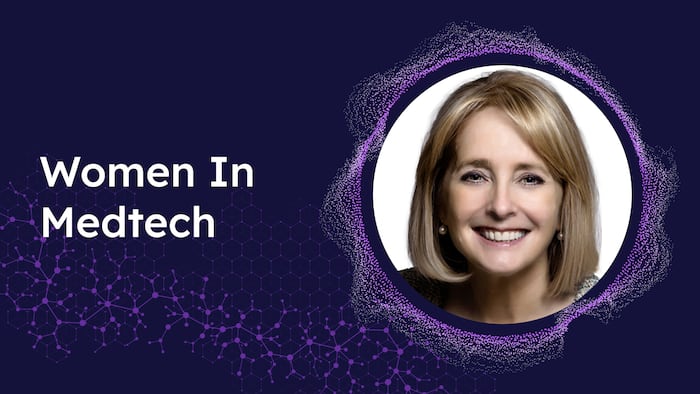Friday, March 8 is International Women’s Day. To celebrate the day and Women’s History Month, Medtech Insight spoke with female leaders in medtech, regulatory and health care delivery about their experiences as women, women-specific industry challenges including research and innovation needs, and how women in leadership roles today are inspiring and empowering rising generations.
On 2 April, more than 200 medtech leaders, mostly women, are expected to attend the annual MedExec Women conference to network, hear about trends and strategies for success, and soak up leadership skills from speakers like Ashley McEvoy, former head of medtech at Johnson & Johnson (Pty) Ltd.
This year will mark the fifth annual gathering, a milestone that Maria Shepherd, who co-founded the organization in 2019 with the late Laurie Halloran, is proud of.
“It's been a huge success,” Maria Shepherd told Medtech Insight. Shepherd, a medtech veteran who is president of consulting group Medi-Vantage, said as more women attend the annual conference, the network of women in the executive ranks continues to grow – and with it the support women can give each other to “pull each other up” in the executive ranks of medtech.
One of the highlights of this year’s event will be an interview with McEvoy, who stepped down as J&J’s medtech leader last year after nearly three decades with the company.
McEvoy will speak about her personal successful journey in medtech, including the importance of having a growth mindset, staying curious, asking questions, and remaining open to continuously learning, according to Shepherd. She believes that while women have come a long way in the still male-dominated medtech industry, they still face barriers such as being overlooked or not being considered for executive roles. She believes that MedExec Women can help empower women by focusing on “strategy, execution, growth and creating a community,” concepts that Shepherd also uses to describe her own career path in medtech.
The interview that follows has been slightly edited for content and length.
What led you to start your own global consulting business Medi-Vantage in 2007?
Maria Shepherd: After being in medical devices, always in marketing, starting at Bard [now part of Becton Dickinson AB], Boston Scientific Corporation and then as vice president of marketing at a small start-up company Oridion [bought by Medtronic plc], and Philips Medical, [the latter] which turned out not to be a good fit for me. I started networking for a new position and people kept saying ‘I already have a director or vice president of marketing, but I have this project I’d love to have you do.’ It was always around strategy and strategic direction. After about six months of doing these projects, I thought to myself, this might be a good business to be in. That was 15 years ago, and it’s been successful ever since.
How many people work at Medi-Vantage?
Shepherd: It’s me and many subject matter experts. I have a very large network of people that I've worked with before and also through MedExec Women.
Who are your medtech clients?
Shepherd: [She declined to give names.] We run the gamut of doing everything along the commercialization of medical devices from helping create marketing specifications to validating them to doing pricing strategy, market strategy, to helping companies look for adjacencies to work in and help with mergers and acquisitions and due diligence. We help clients that are considering an acquisition figure out whether the claims the entrepreneurs are making meet their expectations and the expectations of their end users, which affects evaluation.
How have the consulting needs of medtech companies changed in the last decade?
Shepherd: The needs of med tech companies have changed a lot, but [also] haven't changed that much at all. Investors are getting much more diligent and much more demanding in terms of market validation. They don’t want soft predictions. They want hard predictions based on facts. Everything we do is based on either interviews with end users or on clinical studies that show the difference between the performance of one technology over another or other database of information that we have access to.
What changes have you observed in terms of the roles of women in medtech?
Shepherd: It's still a very male-dominated industry and still not a very integrated industry. I do not see as many women as I would like in the executive ranks, but I expect to see that number grow as more executive women meet more executive women.
I think we will find the capabilities of pulling more women into the executive roles. Once you realize that there's many, many more women out there that are capable and have the skill sets that are needed for executive level roles, it gives everybody the confidence that they can hire more women into executive level roles.
If you look at some organizations like Lantheus Holdings, Inc., the former CEO, Mary Ann Heino, or the former CEO at Insulet Corporation, Shacey Petrovic, had a very good balance of women in their executive ranks. And as these women get promoted, they will be more comfortable in saying to their HR directors, ‘Why am I not seeing more women in the hiring mix? I want to see at least three candidates.’
What are barriers to promoting women to C-suite roles?
Shepherd: Acceptance. When you've got a C-suite of all men, bringing in one woman or more women, that level of acceptance can be hard. What has been a huge shot in the arm for all of this is some states that have mandated that women be on boards of publicly held firms like in California. That mandate has been a great help to increasing the visibility of capable women at the VP, C-suite and board level.
What is your advice for young women who aspire to be leaders in the medtech industry?
Shepherd: Get a mentor. All of my mentors have always been male, so there is no reason not to have a male mentor. A female mentor is great, because they can help you with some of the challenges in being overlooked and also in being groomed for future roles. Sometimes that grooming doesn't happen. And I think a lot of men may be concerned that grooming women for roles might be seen as being overly friendly.
So women grooming other women for executive level roles is a great help.
Also, it was a big boost to my career to get an MBA. I think I would not have become a vice president of marketing without my MBA. I graduated with a science degree from the University of Pennsylvania but getting that training in finance was very helpful.
My other advice: Persevere, work hard, be smarter than everybody else in the room. Don't expect it to be easy and be very, very strategic.







